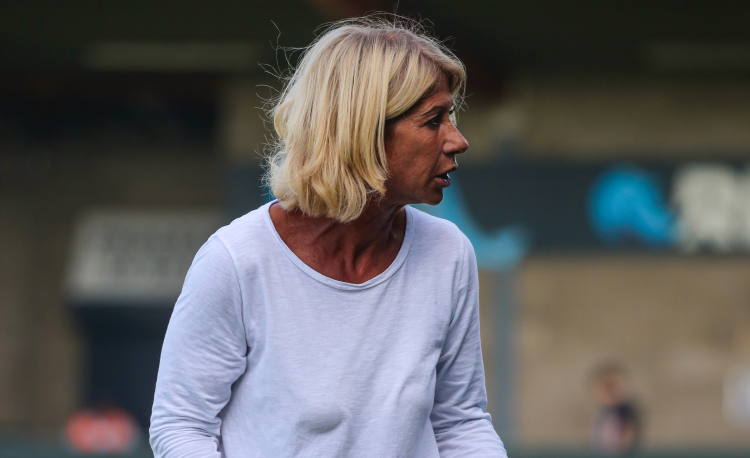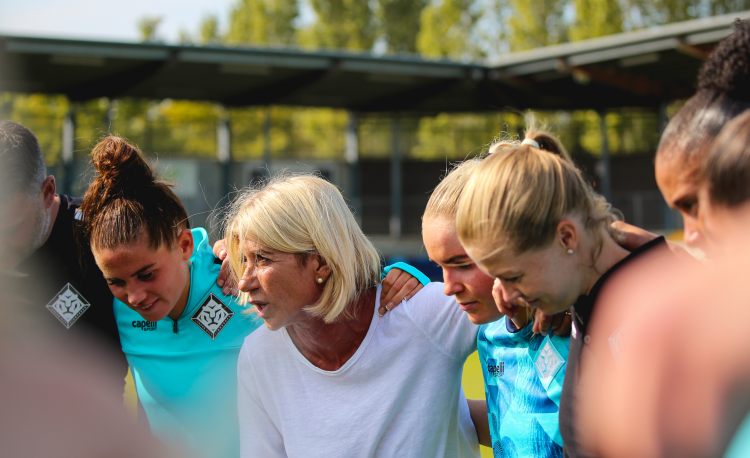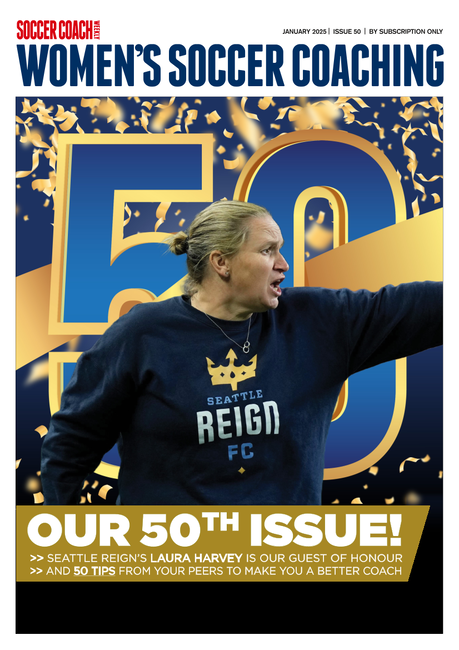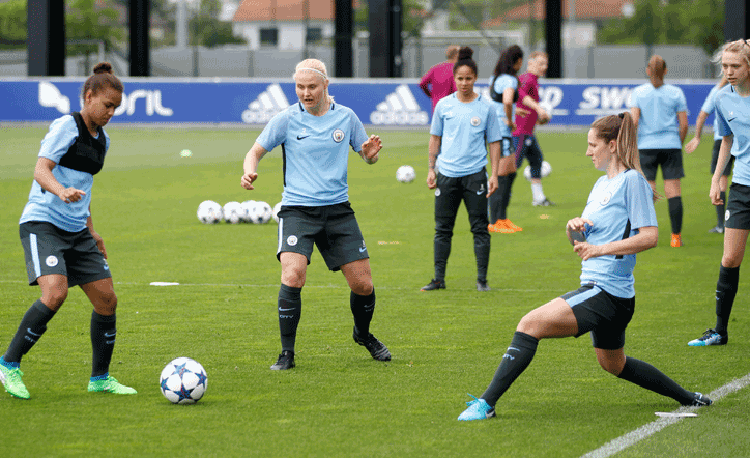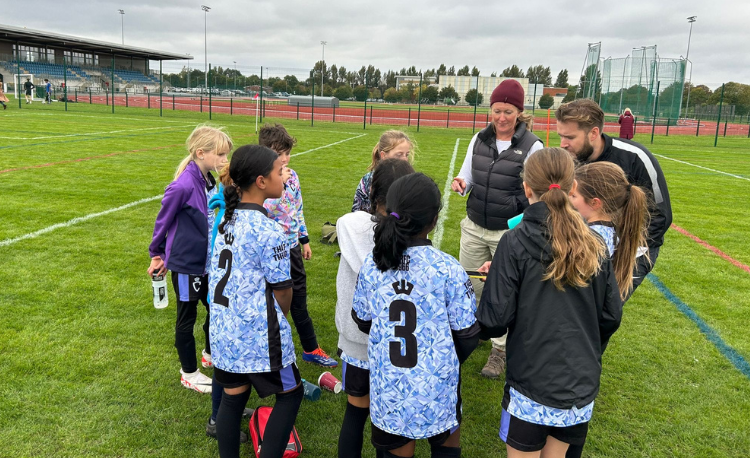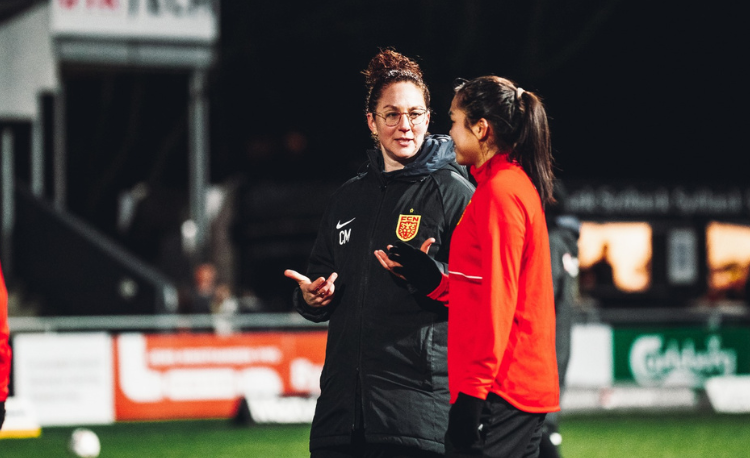You are viewing
1 of your 3 free articles
Carolina Morace: Leading London City Lionesses
She is the new leader of the pack at London City Lionesses. But what lured Italy icon Carolina Morace to England’s second tier? She discusses the reasons and how she gets her playing style across with Steph Fairbairn.
In July, English second-tier club London City Lionesses appointed Carolina Morace as their new head coach.
Announcing her arrival, Ronald Thompson, the club’s head of recruitment, said: “The word ‘legend’ is overused in the modern game but it truly applies to Carolina. When I knew there was a chance that we could bring her to the club, I felt it was something we had to do.”
Speaking to us a few months into her role, Morace was quick to shut down any mention of her being a “legend”.
“I never feel that I’m a legend,” she said. “Maybe because I’m the only player, man or woman, that scored four goals at Wembley is why they call me a legend, but that was when I was a player. It was many years ago!”
She is referring to her goalscoring feat in Italy’s 4-1 victory over England back in 1990.
But the reasons for the levels of respect Morace receives in the game extend far beyond what she did in one match more than 30 years ago.
Morace spent her entire playing career in her native Italy. She was a prolific striker and was Serie A top scorer, representing various clubs, for a remarkable 11 consecutive years, from 1987 to 1998, after which she retired.
She first played for Italy at 14 years old and her international career lasted 19 years.
“Women’s football in England is the best in the world. That’s what pushed me to come...”
Alongside the historic Wembley feat, Morace also scored the first ever hat-trick at a Women’s World Cup, when she put three goals past Chinese Taipei in the inaugural event in 1991. In total, she played for her country 153 times, scoring 105 goals.
As a coach, Morace holds a Uefa Pro Licence and was the first woman to coach a professional men’s team when she took over at Viterbese, in Serie C1, in 1999.
She has since managed the Italy, Canada and Trinidad and Tobago women’s national teams, as well as Milan and Lazio women’s teams. In 2014, she became the first woman to be inducted into the Italian Football Hall of Fame.
So, despite her protests, it is clear to see why Thompson labels Morace a legend - and why London City wanted her on board.
But what was it that made Morace want to take on the challenge?
“I think women’s football in England is the best in the world,” she shares. “What England has achieved in the last 15 years is something amazing.
“There was a big project to develop players and develop the game until the [national] team became champions of Europe and now second in the world.
“That is an amazing achievement for English football. That is what pushed me to come here.
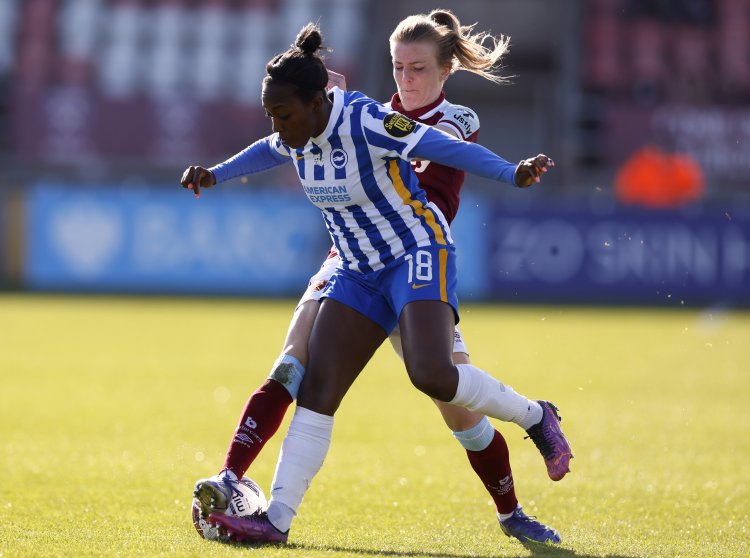
“Also, [there is] the fact that it is an independent club. Sometimes it’s great to have a men’s club behind you but what happened above all in Italy was there was not equal treatment between men’s and women’s sides.
“That is a huge mistake. That doesn’t happen with an independent club. I liked the project.”
The club became independent in 2019 when Millwall Lionesses, as they were then known, broke away from Millwall FC and were renamed.
Since then, the club has maintained its position in the FA Women’s Championship, the second tier of women’s soccer in England.
Yet Morace has been brought in at a time of transition for the club.
She followed her long-term assistant, Nicola Williams, to London City. Williams’ appointment was announced in late June; Morace was confirmed in early July.
Yet Morace wasn’t actually able to get to work on the ground until August 21, while she awaited her visa.
The first job for the pair was recruitment – London City had just three registered players going into the season.
Morace and Williams have since brought in 14 new faces, including big names with significant WSL experience like former Arsenal and Brighton striker Danielle Carter, ex-West Ham, Birmingham and Aston Villa midfielder Ruesha Littlejohn, Scotland international and former Arsenal and Reading defender Emma Mukandi and highly-rated Reading goalkeeper Grace Moloney.
In a short space of time, Morace and Williams have pulled together a squad that they feel can compete in the Championship.
But how did they get so many players of quality to buy into what was essentially a fresh project?
“I have to say that was easy,” Morace said. “I don’t know if that was because they chatted and they know who I am. Playing at a certain level, of course, allows you to better understand the environment.
“It’s not that you are a better coach. To become a better coach you have to study and look at matches. But it is like they understood that I come from where they come.
“I know what it means to feel the pressure. I know what it means to play an important game. I know what it means to lose a game and be starting again.
“I think that maybe they were more open to accept what I will tell them.
“It was also that I did my presentation with my assistant coach [Williams]. We presented our style, our methodology, what I think about the team and what we do.
“I also think they like what we do on the field. I don’t like to present the same session every week.
“Maybe I repeat one session every four months but it’s never the same. They know that there is always something new to learn.
“I think that convinced them because three of them said immediately, before discussing money: ‘I like that, I’m in’. For us, it was a big gratification.
“Also, I watch them and I pick up some things that maybe nobody tells them.
“I was able to say to them: ‘I think that maybe your position could be closer to the net’. They said: ‘Why do you say that?’. And I said: ‘Because I saw you playing.’
“With one player I said: ‘Maybe for you, it’s the same to play centre-back left or right, but your favourite is to play on one side, because I saw that you do this’.
TALKING TACTICS: carolina’s work on the uefa football board
Related Files
“It’s a board of former players, current players, coaches and referees. We talk about the rules of the game, medical staff, what could be better.
“For example, how we have to respect the players that have travelled in Australia or New Zealand [for the World Cup] and they come back and they have to play [league games straight away].
“My proposal was that we also have to talk about the tactics. Because the new football that I can see from coaches like Pep Guardiola, Gegenpressing with Jurgen Klopp or Roberto De Zerbi’s style, is something that I cannot see in women’s football.
“That is something that, in my opinion, we miss.
We have to get there because that is why people and fans love football - because it’s beautiful football.
“It’s not about copying the men’s, but studying more, being more aware about the evolution of football.”
Carolina’s advice for coaches: Learn something every day, build relationships on and off the pitch and prepare well
“First of all, you will learn something every day. If you have the passion to study all the time, it’s a good thing.
“I think also that it’s very important to create a relationship with the players on and off the field.
“I try to be a leader for my players. To be a leader means that I don’t have to show my authority.
“Of course, I’m a coach and I have my authority come from my role so I don’t have to show them that I’m tough. I don’t believe all of this stuff.
“Instead, I think that If you work in a good way and you prepare in a good way for your match on Sunday, you can be relaxed.
“I’m relaxed. I don’t arrive in a technical meeting nervous. I’m okay because I’ve already prepared the match - not the day before, but the week before.
“Every day was a preparation of my match. If I do my job in a good way, I’m okay.”
“They were surprised that we can recognize that. I think that made some difference and pushed them in their decisions.”
Morace and Williams also didn’t get to deliver a pre-season to their squad - meaning, in Morace’s words, they started with “a big handicap”.
“The pre-season, the six weeks, is very important to build up relationships, to understand the players and to show them the way you want to play,” she said.
But for the limited time that they have had, Morace is pleased with the progress and has seen her team connecting with the style that she and Williams favour.
“For the lack of time that we work together, I think that we have already started to play in a different way.
“I could ask the players to kick long balls, but it’s not my style. I think the players deserve more.
“To kick long balls doesn’t help our sport to grow. It’s not my philosophy, my methodology. It’s not something I believe in.
“For sure, it is the easiest way, but I don’t think it’s the best approach for the fans that come to watch women’s football.”
Building from the back is something that Morace believes all players can do.
“It is natural for all players,” she said. “It doesn’t have to be an excuse for the coaches that there is no technique - because the talent of the players is clear.
“It is about coaches bringing that out of the players and presenting exercises and training sessions that help them to improve their technique and, at the same time, to read the game in the right way. It is our responsibility.
“As a coach, I give them more than one solution. They have to pick up the right one...”
“The players are more than happy to play in that way. They start to understand why we do something and how we have to do it.
“It’s not just to play ball possession. It is to build up the game from the back, to recognize who you have to play to - the free team-mate that can receive the ball.
“It’s also about being a modern player. Today, ‘modern player’ means ‘thinking player’.
“As a coach, I have to give them more than one solution. But as a player, they have to pick up, as fast as possible, the right one.”
It may have been the Wembley hat-trick that made her, in the words of others, a legend. Or the consecutive years as the top scorer of the top league in Italy. Or the acclaim of being the first woman in the Hall of Fame.
But perhaps what maintains Morace’s legendary status is this: her focus on the modern and what comes next.
“Football changes all the time,” she said. “What I have to do is study all the time.
“I watch a lot of football. I come from the Italian coaching school where they teach us a lot of details.
“Details are something that you have to always be aware of. If you don’t study, you cannot arrive at that level.
“To be a legend is not something I care too much about. If you come to my house in Rome, I have just one trophy. It is the one where I was inducted in the Hall of Fame. But it’s because the trophy is beautiful, not for other reasons.
“It is all part of the past. I look forward.”
And forward she goes, in her new challenge with London City Lionesses.
Newsletter Sign Up
Newsletter Sign Up
Discover the simple way to become a more effective, more successful soccer coach
In a recent survey 89% of subscribers said Women's Soccer Coaching makes them more confident, 91% said Women's Soccer Coaching makes them a more effective coach and 93% said Women's Soccer Coaching makes them more inspired.
*includes 3 coaching manuals
Get Inspired
All the latest techniques and approaches
Women's Soccer Coaching offers proven and easy to use soccer drills, coaching sessions, practice plans, small-sided games, warm-ups, training tips and advice.
We've been at the cutting edge of soccer coaching since we launched Soccer Coach Weekly in 2007, creating resources for the grassroots youth coach, following best practice from around the world and insights from the professional game.

